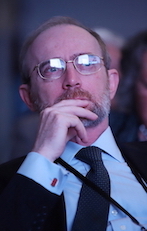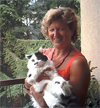Studying at the University of Verona
Here you can find information on the organisational aspects of the Programme, lecture timetables, learning activities and useful contact details for your time at the University, from enrolment to graduation.
Academic calendar
The academic calendar shows the deadlines and scheduled events that are relevant to students, teaching and technical-administrative staff of the University. Public holidays and University closures are also indicated. The academic year normally begins on 1 October each year and ends on 30 September of the following year.
Course calendar
The Academic Calendar sets out the degree programme lecture and exam timetables, as well as the relevant university closure dates..
| Period | From | To |
|---|---|---|
| Sem. IA | Sep 25, 2017 | Nov 11, 2017 |
| Sem. IB | Nov 13, 2017 | Jan 20, 2018 |
| Sem. IIA | Feb 26, 2018 | Apr 21, 2018 |
| Sem. IIB | Apr 23, 2018 | Jun 9, 2018 |
| Session | From | To |
|---|---|---|
| Sessione Invernale | Jan 22, 2018 | Feb 24, 2018 |
| Sessione Estiva | Jun 11, 2018 | Jul 28, 2018 |
| Sessione Autunnale | Aug 27, 2018 | Sep 22, 2018 |
| Sessione Straordinaria | Jan 14, 2019 | Feb 16, 2019 |
| Session | From | To |
|---|---|---|
| Sessione Estiva | Jul 16, 2018 | Jul 21, 2018 |
| Sessione Autunnale | Nov 12, 2018 | Nov 17, 2018 |
| Sessione Primaverile | Apr 1, 2019 | Apr 6, 2019 |
| Period | From | To |
|---|---|---|
| All Saints Day | Nov 1, 2017 | Nov 1, 2017 |
| Immaculate Conception | Dec 8, 2017 | Dec 8, 2017 |
| Christmas break | Dec 22, 2017 | Jan 7, 2018 |
| Easter break | Mar 30, 2018 | Apr 3, 2018 |
| Liberation Day | Apr 25, 2018 | Apr 25, 2018 |
| Labour Day | May 1, 2018 | May 1, 2018 |
| Patron Saint Day | May 21, 2018 | May 21, 2018 |
| Republic Day | Jun 2, 2018 | Jun 2, 2018 |
| Summer break | Aug 13, 2018 | Aug 18, 2018 |
Exam calendar
Exam dates and rounds are managed by the relevant Humanistic Studies Teaching and Student Services Unit.
To view all the exam sessions available, please use the Exam dashboard on ESSE3.
If you forgot your login details or have problems logging in, please contact the relevant IT HelpDesk, or check the login details recovery web page.
Should you have any doubts or questions, please check the Enrollment FAQs
Academic staff
 claudia.annechini@univr.it
claudia.annechini@univr.it
 linda.napolitano@univr.it
linda.napolitano@univr.it

Pozzo Riccardo
 riccardo.pozzo@univr.it
riccardo.pozzo@univr.it
 +390458028053
+390458028053
 nicola.righetti@univie.ac.at
nicola.righetti@univie.ac.at
Study Plan
The Study Plan includes all modules, teaching and learning activities that each student will need to undertake during their time at the University.
Please select your Study Plan based on your enrollment year.
1° Year
| Modules | Credits | TAF | SSD |
|---|
5 course to be chosen among the followingOne course to be chosen among the following3 course to be chosen among the followingOther activitites2° Year activated in the A.Y. 2018/2019
| Modules | Credits | TAF | SSD |
|---|
2 course to be chosen among the following| Modules | Credits | TAF | SSD |
|---|
5 course to be chosen among the followingOne course to be chosen among the following3 course to be chosen among the followingOther activitites| Modules | Credits | TAF | SSD |
|---|
2 course to be chosen among the following| Modules | Credits | TAF | SSD |
|---|
Legend | Type of training activity (TTA)
TAF (Type of Educational Activity) All courses and activities are classified into different types of educational activities, indicated by a letter.
General sociology (m) (2018/2019)
Teaching code
4S02307
Teacher
Coordinator
Credits
6
Language
Italian
Scientific Disciplinary Sector (SSD)
SPS/07 - GENERAL SOCIOLOGY
Period
Sem. 2A dal Feb 18, 2019 al Mar 30, 2019.
Learning outcomes
The course aims to present an overview of the main authors, concepts, thematic areas and epistemological paradigms of sociology. A specific attention will be paid to religious phenomena in order to understand the characteristics of sociological knowledge, differentiating it from other disciplines, as well as to reach an overall vision of the social and cultural transformations of modernity.
The course aims to develop student's critical thinking and learning skills. At the end of the course the student should demonstrate a general knowledge of the key concepts of sociology, the ability to connect them and to articulate a personal reflection on the social transformations of modernity.
Program
1) The sociological discipline (historical context, disciplinary boundaries, areas of investigation)
2) the sociological theory, epistemology and methodology
3) The classical sociologists and their contribution to the discipline
4) The main categories of sociology (culture, social structure, socialization, interaction, organizations, deviance and social control ...)
5) Religious, quasi-religious phenomena and transformations of the sacred in modern and contemporary society
The reference texts for attending and not attending consist in a manual plus a book chosen from those indicated.
Handbook:
• F. Crespi, “Il pensiero sociologico”, Il Mulino, Bologna, 2002
A book chosen from the following:
• B.R. Wilson, “La religione nel mondo contemporaneo”, Il Mulino, Bologna, 1996 (ed. orig. 1982, “Religion in sociological perspective”)
• A. Aldridge, “La religione nel mondo contemporaneo. Una prospettiva sociologica”. Il Mulino, Bologna, 2005 (ed. orig. 2000, “Religion in the Contemporary World: A Sociological Introduction”)
• N. Righetti, "Tra sacro e vegano", Ferrari Editore, Corigliano-Rossano, 2018
• N. Righetti, “Le forme materiali della vita religiosa”, Franco Angeli, Milano, 2018 (ebook)
Optional bibliography:
• R. Aron, “Le tappe del pensiero sociologico. Montesquieu, Comte, Marx, Tocqueville, Durkheim, Pareto, Weber”, Mondadori, Milano, 1989 (ed. orig. 1965, “Main Currents in Sociological Thought”)
• A. Bagnasco, M. Barbagli, A. Cavalli, “Corso di Sociologia”, Il Mulino, Bologna, 2007
• D. Secondulfo, “Alla radice delle medicine alternative: il concetto di energia”, in Secondulfo D. (a cura di), Il mondo delle medicine alternative. Immagini, percorsi, pazienti, Franco Angeli, Milano, 2009.
| Author | Title | Publishing house | Year | ISBN | Notes |
|---|---|---|---|---|---|
| A. Bagnasco, M. Barbagli, A. Cavalli | Corso di Sociologia | Il Mulino | 2007 | Ulteriore riferimento bibliografico (non obbligatorio) | |
| D. Secondulfo | Il mondo delle medicine alternative. Immagini, percorsi, pazienti | Franco Angeli | 2009 | Ulteriore riferimento bibliografico (non obbligatorio) Solo il capitolo: D. Secondulfo, "Alla radice delle medicine alternative: il concetto di energia" | |
| Franco Crespi | Il pensiero sociologico | Il Mulino | 2002 | Manuale. Testo obbligatorio | |
| B.R. Wilson | La religione nel mondo contemporaneo | Il Mulino | 1996 | Libro a scelta | |
| A. Aldridge | La religione nel mondo contemporaneo. Una prospettiva sociologica | Il Mulino | 2005 | Libro a scelta | |
| N. Righetti | Le forme materiali della vita religiosa | Franco Angeli | 2018 | Libro a scelta (solo in formato eBook) | |
| R. Aron | Le tappe del pensiero sociologico. Montesquieu, Comte, Marx, Tocqueville, Durkheim, Pareto, Weber | Mondadori | 1989 | Ulteriore riferimento bibliografico (non obbligatorio) | |
| N. Righetti | Tra sacro e vegano | Ferrari Editore | 2018 | Libro a scelta |
Examination Methods
The exam will consist of an interview on the concepts illustrated during the course. The bibliographical references will be the manual and one of the books indicated in the bibliographic section of this web page. The knowledge of the contents, the capacity of personal and critical link between topics will be evaluated.
Attending students have the opportunity to choose whether to take the exam by presenting and discussing a dissertation on a topic agreed with the teacher and based on the bibliography of the course, or by an oral interview on the topics related to the same bibliography.
For not attending students, the exam will consist of an oral interview on the texts indicated in the bibliography.
Type D and Type F activities
Modules not yet included
Career prospects
Module/Programme news
News for students
There you will find information, resources and services useful during your time at the University (Student’s exam record, your study plan on ESSE3, Distance Learning courses, university email account, office forms, administrative procedures, etc.). You can log into MyUnivr with your GIA login details: only in this way will you be able to receive notification of all the notices from your teachers and your secretariat via email and soon also via the Univr app.
Competenze linguistiche
I crediti formativi universitari relativi alle "Ulteriori competenze linguistiche" (B1 informatizzato se seconda lingua; livello B2 completo se stessa lingua della triennale) possono essere acquisiti in una delle due seguenti modalità:
- iscrizione da parte della/o studente presso il Centro Linguistico di Ateneo (CLA ➔ https://cla.univr.it/it/test-e-certificazioni) per il sostenimento e il superamento delle prove + iscrizione, sempre da parte della/o studente, in apposita lista per la registrazione crediti e registrazione CFU (senza presenza) da parte dell’Università.
Oppure
- equipollenza di certificazioni linguistiche esterne: riconoscimento equipollenza di certificazioni linguistiche esterne (➔ https://cla.univr.it/it/servizi/riconoscimento-delle-certificazioni-linguistiche-esterne).
Gestione carriere
Linguistic training CLA
Internships
Graduation
Documents
| Title | Info File |
|---|---|
|
|
pdf, it, 99 KB, 13/10/23 |
|
|
pdf, it, 101 KB, 10/04/24 |
List of theses and work experience proposals
| theses proposals | Research area |
|---|---|
| Linguaggio e mito in Tolkien | ENGLISH LITERATURE - Critical Theory & Poetics |
| Dialettica del negativo in Meister Eckhart | HISTORY OF PHILOSOPHY - MIDDLE AGES |
| La felicità nel Medioevo | HISTORY OF PHILOSOPHY - MIDDLE AGES |
| Le figure di Eva e Maria in Ildegarda di Bingen | HISTORY OF PHILOSOPHY - MIDDLE AGES |
| IA. Una critica fenomenologica al concetto di Intelligenza Artificiale | The Human Mind and Its Complexity: Cognitive science, psychology, linguistics, philosophy of mind - Philosophy of science, epistemology and logic |
Practical information for students
Documents
| Title | Info File |
|---|---|
|
|
pdf, it, 325 KB, 02/05/23 |
|
|
pdf, it, 212 KB, 02/05/23 |
|
|
pdf, it, 131 KB, 02/05/23 |





















